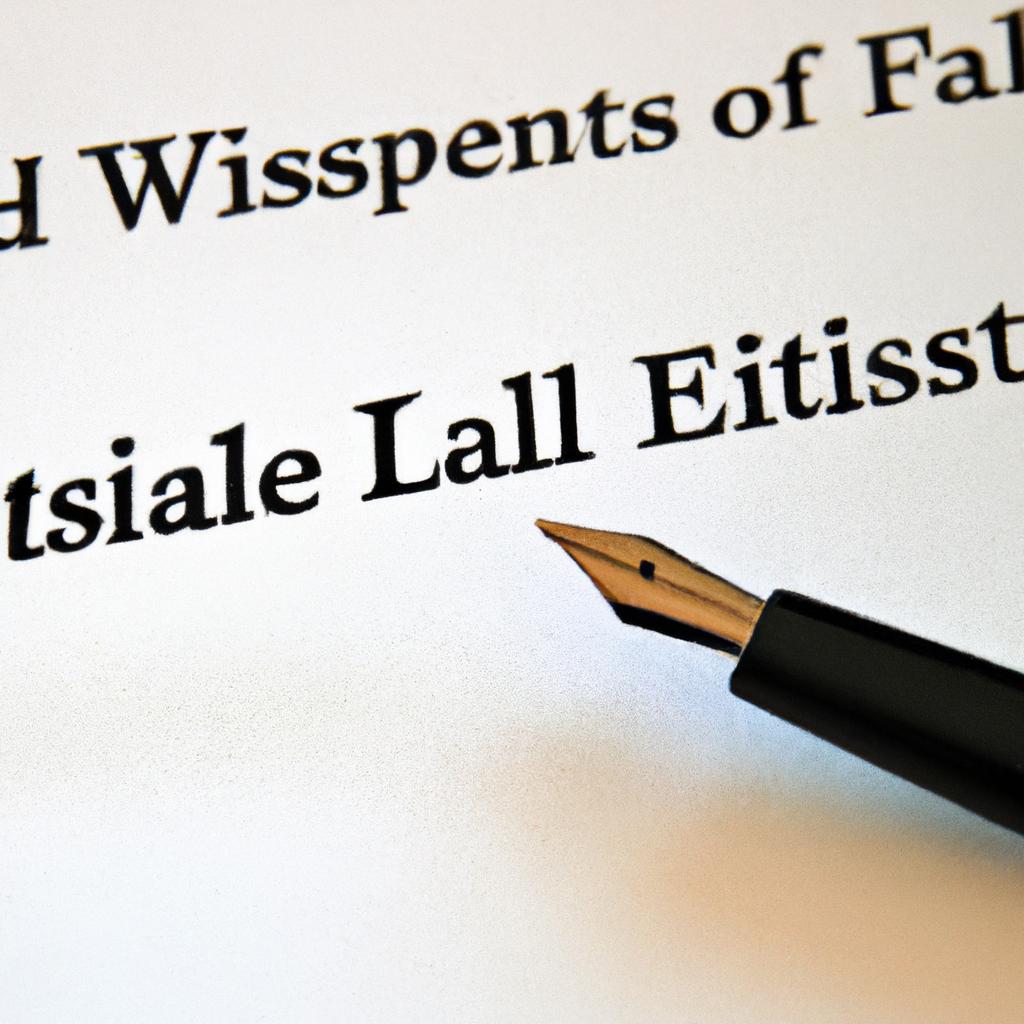In the intricate realm of estate planning, the distinction between a will and a trust is often a source of confusion for many individuals. As seasoned practitioners in the field of law, we at Morgan Legal Group, situated in the bustling metropolis of New York City, understand the importance of delineating between these two essential components. In this article, we aim to elucidate the nuances and disparities between wills and trusts, providing our readers with a comprehensive understanding of their respective functions and benefits. Join us as we navigate through the complexities of estate planning, probate, and elder law, shedding light on the intricacies of wills and trusts.
Key distinctions between a Last Will and Testament and a Trust
When it comes to estate planning, it is crucial to understand the key differences between a Last Will and Testament and a Trust. While both serve as important legal documents to dictate how your assets will be distributed after your passing, they have distinct characteristics that can greatly impact the administration of your estate.
One of the main differences between a Will and a Trust is the time at which they take effect. A Will only becomes effective upon your death, while a Trust can be created during your lifetime and can manage your assets both during your lifetime and after your death. Additionally, Wills are subject to probate, which is a court-supervised process of distributing assets, while Trusts typically avoid probate altogether. Trusts also offer greater privacy as they do not become part of the public record like Wills do.

Understanding the roles and limitations of a Will in estate planning
When it comes to estate planning, understanding the roles and limitations of a Will is crucial. A Will is a legal document that outlines how a person’s assets and property should be distributed after their passing. While a Will is an essential part of an estate plan, it does have its limitations. It only goes into effect after the person has passed away, and it must go through the probate process, which can be time-consuming and costly.
On the other hand, a trust is a legal arrangement where a trustee holds assets on behalf of a beneficiary. Unlike a Will, a trust can take effect during the person’s lifetime and can help avoid probate. Additionally, a trust offers more privacy since it does not go through the public probate process. Overall, understanding the differences between a Will and a trust is essential in creating a comprehensive estate plan that meets your needs and goals.

The benefits and advantages of setting up a Trust over a Will
When it comes to planning for the future and ensuring your assets are distributed according to your wishes, setting up a trust can offer numerous benefits over a traditional will. One key advantage of a trust is that it allows for greater control and flexibility in how your assets are managed and distributed. Unlike a will, which must go through the probate process, a trust typically allows for a faster and more private distribution of assets to beneficiaries.
Another advantage of a trust is the ability to provide for incapacity planning. By appointing a successor trustee to manage your affairs in the event you become incapacitated, a trust can help ensure your wishes are carried out while avoiding the need for a court-appointed guardian. Additionally, trusts can offer potential tax benefits and protection from creditors, making them a valuable tool for estate planning.

Strategic recommendations for incorporating both a Will and Trust in estate plans
Estate planning is a complex process that involves a variety of legal documents to ensure your assets are distributed according to your wishes after you pass away. Two common options for incorporating both a Will and Trust in estate plans are the Last Will and Testament and a Revocable Living Trust. Understanding the differences between these two documents can help individuals make informed decisions about their estate planning needs.
One key difference between a Will and a Trust is how they distribute assets after death. A Will goes through probate, a court-supervised process that can be time-consuming and costly. On the other hand, a Trust allows assets to bypass probate and be distributed directly to beneficiaries, providing a more efficient and private process. Additionally, a Trust can help individuals manage their assets during their lifetime, offering greater flexibility and control over how their wealth is handled. Considering these factors, it is recommended to consult with an experienced estate planning attorney to determine the best strategy for incorporating both a Will and Trust into your estate plan.
Q&A
Q: What is the main difference between a will and a trust?
A: A will is a legal document that outlines how a person’s assets and property should be distributed after their death, while a trust is a legal arrangement where a trustee holds and manages assets on behalf of beneficiaries.
Q: Why would someone choose to create a trust instead of just a will?
A: One reason someone might choose a trust over a will is to avoid probate, which can be a lengthy and costly process. Trusts also offer more privacy and flexibility in how assets are distributed.
Q: Can a will and a trust work together?
A: Yes, many people choose to have both a will and a trust as part of their estate planning strategy. The will can address any assets that were not transferred to the trust during the person’s lifetime.
Q: Are there any drawbacks to using a trust instead of a will?
A: Trusts can be more expensive to set up and maintain than wills, and they require ongoing management. Additionally, trusts do not have the same level of oversight and accountability as probate courts do with wills.
Q: How do I know which option is best for me?
A: It’s important to consult with a qualified estate planning attorney to discuss your unique situation and goals. They can help you determine whether a will, a trust, or a combination of both is the best approach for your estate planning needs.
In Retrospect
In conclusion, understanding the differences between a will and a trust is essential in order to effectively plan for the distribution of your assets after you pass away. Both legal documents serve important purposes and can help ensure that your final wishes are carried out according to your wishes. Whether you choose a will, a trust, or a combination of both, it is crucial to seek the guidance of legal professionals to help you navigate the complex world of estate planning. By taking the time to carefully consider your options, you can create a plan that provides peace of mind for you and your loved ones for years to come.
 The topic of “differences between will and trust” is often a confusing and intimidating one for many people. Both wills and trusts are important legal documents used for estate planning and ensuring that an individual’s assets are distributed according to their wishes after their passing. While they serve similar purposes, there are distinct differences between the two that are important to understand in order to make informed decisions about which option is right for you. In this article, we will explore the key differences between wills and trusts, and how they can benefit you and your loved ones.
The topic of “differences between will and trust” is often a confusing and intimidating one for many people. Both wills and trusts are important legal documents used for estate planning and ensuring that an individual’s assets are distributed according to their wishes after their passing. While they serve similar purposes, there are distinct differences between the two that are important to understand in order to make informed decisions about which option is right for you. In this article, we will explore the key differences between wills and trusts, and how they can benefit you and your loved ones.
First, let’s understand what a will and a trust are. A will is a legal document that outlines how a person’s assets will be distributed after their death. It also names an executor who will handle the distribution of assets, as well as guardians for any minor children. On the other hand, a trust is an entity that holds assets for the benefit of individuals, known as beneficiaries. The trust provides instructions for how the assets should be managed and distributed to the beneficiaries. Now, let’s dive into the key differences between these two important legal documents.
1. Distribution of assets:
The main difference between a will and a trust lies in how assets are distributed. With a will, assets are distributed after the individual’s passing, while a trust allows for assets to be distributed during the individual’s lifetime or after their death, depending on the type of trust. A will must go through the probate process, which can be lengthy and expensive, while a trust can avoid probate altogether.
2. Privacy:
Another difference to consider when choosing between a will and a trust is privacy. Wills are public record and can be accessed by anyone, which may pose a security risk for beneficiaries. Trusts, on the other hand, are private documents and are not required to be filed with the court, providing a level of privacy for beneficiaries and their assets.
3. Managing assets:
A will only goes into effect after the individual has passed away, therefore, assets cannot be managed through a will while the individual is still alive. A trust, however, can be created to manage assets while the individual is still alive, providing a level of control and flexibility for the individual.
4. Types of assets held:
Wills are typically used to distribute assets such as real estate, personal belongings, and investments. Trusts can hold a wider range of assets, including real estate, investments, life insurance policies, and more. This is because trusts are a separate legal entity and can therefore hold and manage assets in a more efficient manner.
5. Taxes:
Another important factor to consider when deciding between a will and a trust is taxes. Wills are subject to estate taxes, which are paid by the estate before distribution to beneficiaries. Trusts, on the other hand, can be set up to minimize or eliminate estate taxes.
6. Cost:
The cost of creating a will is generally less expensive than creating a trust. However, it is important to consider the long-term cost implications. As mentioned, wills require the probate process, which can be expensive. Trusts can avoid probate and can provide cost savings in the long run.
Benefits of a Will:
– Straightforward and easy to create
– Can be updated or revoked at any time
– Can name an executor to handle the distribution of assets
– Can provide instructions for final arrangements such as funeral arrangements
Benefits of a Trust:
– Can distribute assets during lifetime or after death
– Allows for ongoing management of assets for minors or individuals with special needs
– Offers privacy for beneficiaries and assets
– Can minimize estate taxes
Practical Tips:
– Consult with a legal professional to understand which option is best for your specific needs and situation.
– Review and update your will or trust regularly, especially after major life events such as marriage, birth of a child, or divorce.
– Be specific and clear in your will or trust to avoid confusion and disputes among beneficiaries.
In conclusion, both wills and trusts are important legal documents that are used for estate planning and ensuring the distribution of assets according to an individual’s wishes. While they have similarities, it is crucial to understand the key differences between the two in order to make informed decisions and ensure the best outcome for loved ones. Whether you choose a will or a trust, it is important to regularly review and update your wishes to ensure they align with your current situation and desires. Consult with a legal professional for personalized guidance in creating a comprehensive estate plan.












